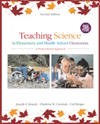 |  Teaching Children Science: A Project-Based Approach, 2/e Joe Krajcik,
University of Michigan - Ann Arbor
Charlene Czerniak,
University of Toledo
Carl Berger,
University of Michigan - Ann Arbor
How Are Scientific Investigations Developed?
Chapter Summary- Investigations are an important part of elementary and middle school science instruction and meet important aspects of the National Science Education Standards.
- One way of thinking about the process of investigation is to think of a nonlinear investigation web.
- The investigation web can be thought of as consisting of several iterative processes:
- messing about so that students can initially explore ideas,
- asking and refining questions that can be investigated by students,
- hypothesizing,
- making predictions about the results,
- finding information that will provide direction for the investigation,
- planning and designing a procedure,
- carrying out the procedures and sometimes refining them,
- making sense of data by transforming it and analyzing it,
- drawing conclusions and making judgments about the conclusions,
- sharing with others, which might lead to changes and modifications, and
- moving into the next round of investigation based on things learned.
- It is important for teachers to support students' implementation of investigations. One way to do this is to model an investigation, have students perform their own investigation, and provide feedback.
- Teachers can assess the value of an investigation to determine if students are doing the cognitive work rather than having science done for them.
|
|



 2003 McGraw-Hill Higher Education
2003 McGraw-Hill Higher Education